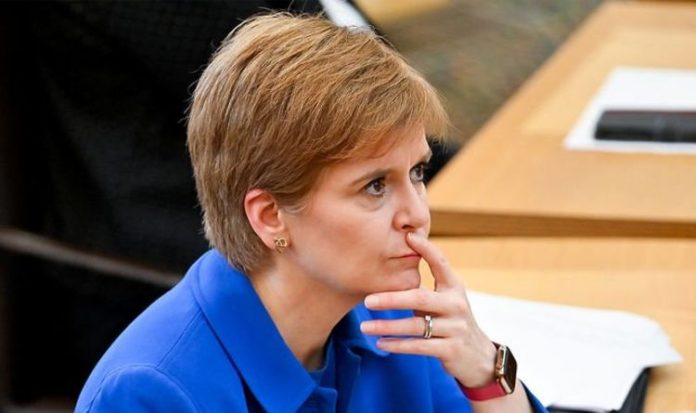The Scottish First Minister will publish plans for a second independence referendum as the Scottish National Party (SNP) look to capitalise on growing support. Ms Sturgeon has taken the legal route to a second referendum, using a section 30 order to try and transfer the powers to call an independence vote from Westminster to Holyrood. In recent months, there has also been a sustained rise in support for independence, polling suggests.
Polling in August by Panelbase shows 55 percent are in favour of breaking with the union, with 45 percent against – an exact reversal of the 2014 referendum result.
But with a second independence referendum seeming unlikely to happen in the near future, figures within the SNP have grown impatient.
Ms Sturgeon made a speech calling for patience in January, but this didn’t stop some fellow independence advocates taking aim at the First Minister.
SNP MP Angus MacNeil took to social media to describe the First Minister’s plan as “hard to fathom” while insisting that a consultative referendum “should be pursued without delay”.
Pro-independence campaigner Christopher McEleny said that a “much more radical approach” was needed than that unveiled by the First Minister.
He added: “What’s stopping us asking the Lord Advocate right now if he thinks the Scottish Parliament has the legal competence to hold an advisory referendum on Scottish independence?”
The most brutal comments came from then-Scottish Conservatives leader Jackson Carlaw, who described Ms Sturgeon’s efforts as “depressing”.
He said: “Nicola Sturgeon’s determination to plough on with preparations for another vote on independence is predictable, depressing and entirely wrong-headed.
READ MORE: SNP civil war: Nicola Sturgeon’s ‘cult of personality’ sparks division
Ben Thomson, an Edinburgh businessman with small think tank, Reform Scotland, highlighted how the SNP may still need to convince many that the economic impact of independence won’t compromise Scotland.
He has argued that, to bring down the budget deficit of eight-nine percent, a fully devolved Scotland would have to raise taxes, or spend less, or even both.
He added that “if you want to stand on your own two feet, that is the price you have to pay”.
The SNP quietly admitted in the 2018 report of the Sustainable Growth Commission that a period of mild austerity might have to be in force for some years after independence.







